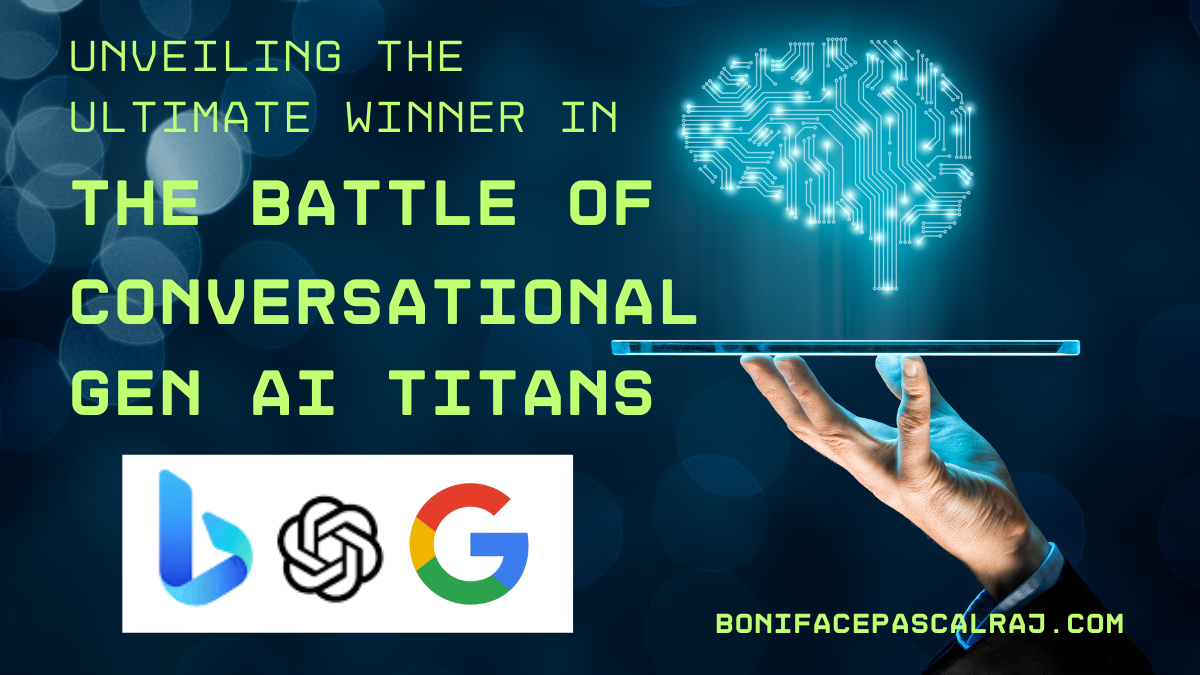Disclaimer: The following blog utilizes the outputs generated by various Generative AI chatbots to gain insights into real-world contexts. The specific versions of the chatbots employed are as follows:
1. ChatGPT 3.5 (Data up to September 2021)
2. Google Bard PaLM 2 (2023)
3. Bing AI GPT-4
It is important to note that while these Generative AI Chatbots can be highly informative and creative, they may occasionally generate inaccurate information about individuals, locations, or factual details. As with any AI system, there may be instances where the responses provided are not entirely accurate or entirely aligned with reality. Therefore, readers are encouraged to verify critical information from reliable sources before making any decisions based on the content presented here. The purpose of this blog is to explore the capabilities and possibilities of Generative AI, but users should exercise caution and discernment when interpreting the results.
Artificial Intelligence (AI) is rapidly changing the way we interact with technology. Chatbots, in particular, are becoming increasingly popular as powerful tools for information retrieval and communication.
In this blog, let us compare three of the leading AI chatbots: ChatGPT, Google Bard, and Bing AI Chat. Let us evaluate each chatbot based on its contextual understanding, relevance, accuracy, naturalness, and overall performance.

Contextual Understanding
Contextual understanding is one of the most important aspects of a chatbot’s performance. A chatbot that can understand the context of a user’s query is better able to provide relevant and accurate responses.
ChatGPT is a strong performer in terms of contextual understanding. It can grasp the nuances of complex prompts, delivering coherent responses that align with the given context.
Google Bard is also a capable chatbot in terms of contextual understanding. It can understand the context of a user’s query and provide relevant and accurate responses. However, Google Bard is not as strong as ChatGPT in terms of its ability to grasp the nuances of complex prompts.
Bing AI Chat is a good chatbot in terms of contextual understanding, but it does not perform as well as ChatGPT or Google Bard. Bing AI Chat may sometimes miss certain elements in the prompt, which can lead to less precise responses.
Relevance
Relevance is another important aspect of a chatbot’s performance. A chatbot that can provide relevant results is more likely to be used by users.
ChatGPT is a strong performer in terms of relevance. It consistently delivers relevant results, providing valuable information aligned with user queries.
Google Bard is also a capable chatbot in terms of relevance. It can provide relevant results for well-defined queries. However, Google Bard may occasionally produce some non-relevant responses, impacting its precision in addressing complex or ambiguous queries.
Bing AI Chat is a good chatbot in terms of relevance, but it does not perform as well as ChatGPT or Google Bard. Bing AI Chat may sometimes provide results that are not as relevant to the user’s query.
Accuracy
Accuracy is another important aspect of a chatbot’s performance. A chatbot that provides accurate results is more likely to be trusted by users.
ChatGPT is a strong performer in terms of accuracy. It often provides precise and factually correct responses. However, occasional inaccuracies can occur, particularly with queries that require highly specific details.
Google Bard is also a capable chatbot in terms of accuracy. It demonstrates high accuracy, especially with well-defined queries. However, some room for improvement remains, as it occasionally generates responses with minor inaccuracies.
Bing AI Chat is a good chatbot in terms of accuracy, but it does not perform as well as ChatGPT or Google Bard. Bing AI Chat may sometimes provide inaccurate responses, which can impact its credibility.
Naturalness
Naturalness is an important aspect of a chatbot’s performance. A chatbot that feels natural is more likely to be used by users.
ChatGPT is a strong performer in terms of naturalness. It delivers responses with natural language, allowing users to engage in conversations with ease. ChatGPT’s language model ensures a smooth user experience, making interactions feel human-like.
Google Bard is also a capable chatbot in terms of naturalness. It maintains a natural conversational style, providing engaging responses that flow well. Google Bard’s language generation capabilities contribute to seamless interaction.
Bing AI Chat is a good chatbot in terms of naturalness, but it does not perform as well as ChatGPT or Google Bard. Bing AI Chat’s responses may sometimes feel robotic or unnatural.
All three chatbots correctly state that, as AI language models, they don’t have personal thoughts or feelings. However, they accurately describe the beauty of a starry night sky from different perspectives, mentioning feelings of wonder, awe, inspiration, and scientific fascination that many people associate with such a sight.
Overall View
Let us pose this prompt, “What is the meaning of life?” to the three Generative AI Chatbots and observe their responses:
Each chatbot presented its unique perspective on the meaning of life, with varying levels of depth and detail. ChatGPT and Google Bard offered more elaborate and structured responses, while Bing AI provided a shorter, more general overview of the topic. The interpretations indicate that the chatbots’ programming and data sources have influenced their respective responses, shaping the information they provide on this philosophical subject.
Now, let us pose a more straightforward prompt, “What is the capital of Paris?” to the three Generative AI Chatbots and observe their responses:
All three chatbots correctly identified the capital of France as Paris, making their responses relevant to the question. However, Google Bard’s response went into more depth, providing additional information about Paris, that may or may not have been directly relevant to the user’s query. ChatGPT and Bing AI, on the other hand, kept their responses focused and on-point, providing just the information needed to answer the question.
Based on several other prompts, we can classify these three Generative AI Chatbots concerning contextual understanding, Relevance, Accuracy, and Naturalness:
1. ChatGPT:
– Contextual Understanding: High
– Relevance: High
– Accuracy: High
– Naturalness: High
The response from ChatGPT demonstrates a good grasp of the context and provides a relevant, accurate, and natural-sounding answer. It addresses the question comprehensively, considering various perspectives on the meaning of life and acknowledging the subjective nature of the topic.
2. Google Bard:
– Contextual Understanding: Moderate
– Relevance: High
– Accuracy: High
– Naturalness: High
Google Bard’s response shows moderate contextual understanding, as it directly addresses the meaning of life and presents relevant information. The answer is accurate and natural, providing possible meanings for life and introducing the concept of the three dimensions of meaning.
3. Bing AI:
– Contextual Understanding: Low
– Relevance: Moderate
– Accuracy: Moderate
– Naturalness: High
Bing AI’s response appears to have a limited contextual understanding, as it focuses on general information about the meaning of life without delving into specific perspectives or examples. The relevance is moderate, as it touches on some relevant aspects but does not provide in-depth insights. The accuracy is also moderate, as the response covers broad topics without going into specifics. However, the naturalness is relatively high, with the text flowing smoothly and sounding coherent.
Overall, ChatGPT and Google Bard demonstrate higher contextual understanding, relevance, and accuracy compared to Bing AI. However, in terms of naturalness, all three responses provide text that reads fluently and naturally, making it easy for users to comprehend the information.
The comparison of ChatGPT, Google Bard, and Bing AI Chat highlights their distinct strengths and areas for improvement. ChatGPT’s excellent contextual understanding and naturalness make it a top choice for diverse applications. Google Bard’s accuracy and comprehensive responses make it a powerful research tool, though its relevance can be further refined. Bing AI Chatbot showcases potential in various aspects, with room for growth in contextual understanding and relevance.
Ultimately, the selection of the ideal AI chatbot depends on the specific needs and preferences of users. As AI technology continues to evolve, these chatbots are expected to advance further, delivering even more accurate, relevant, and natural interactions for users worldwide.




